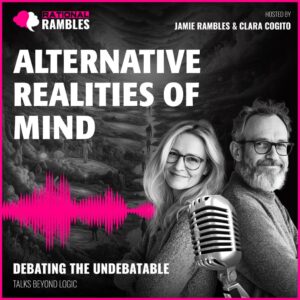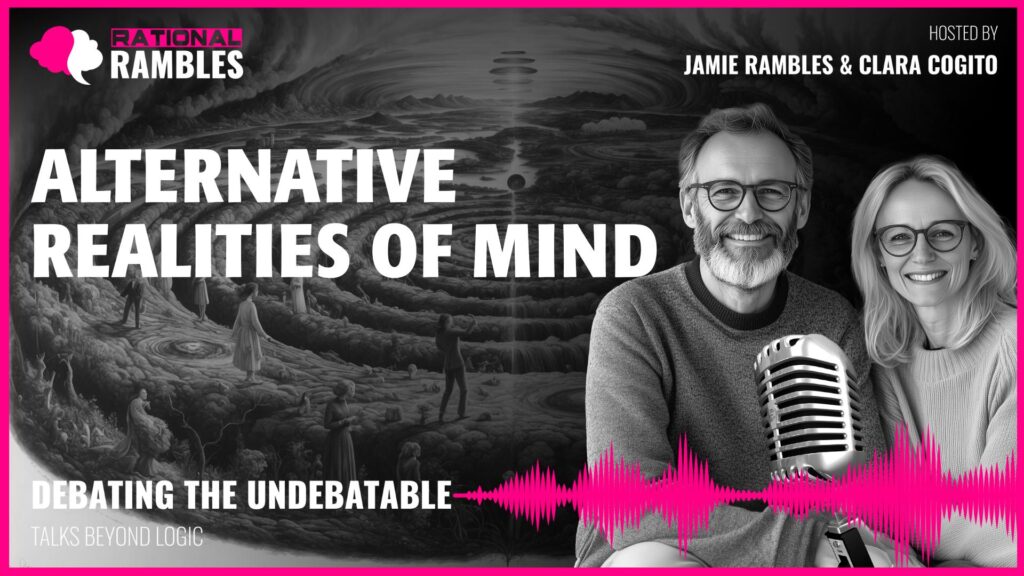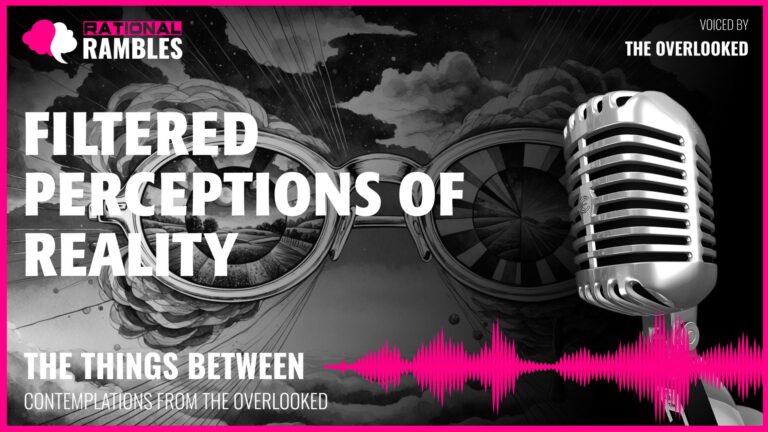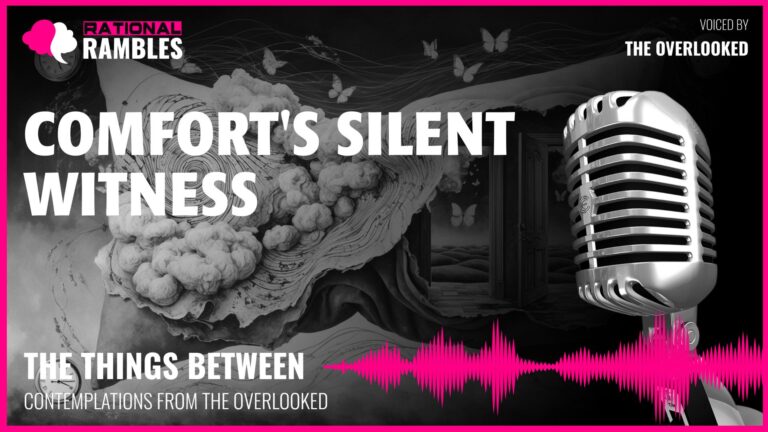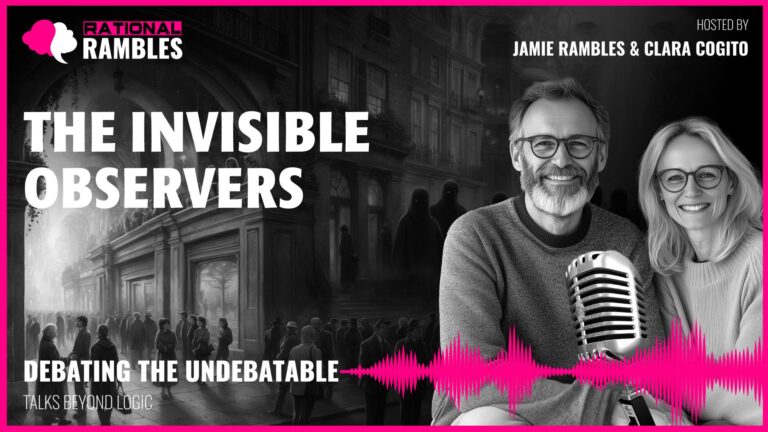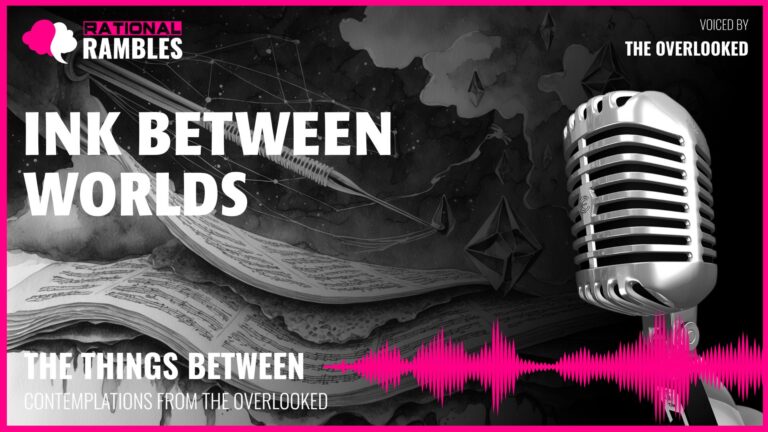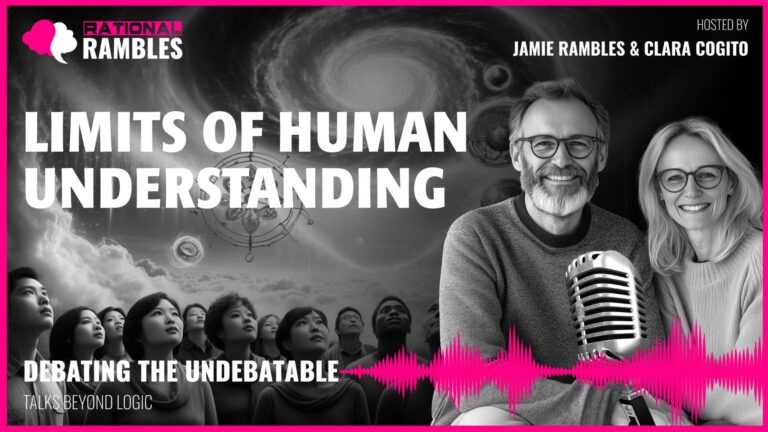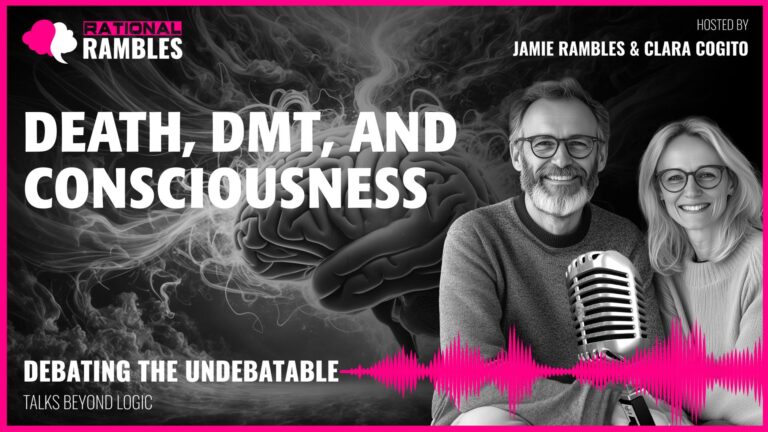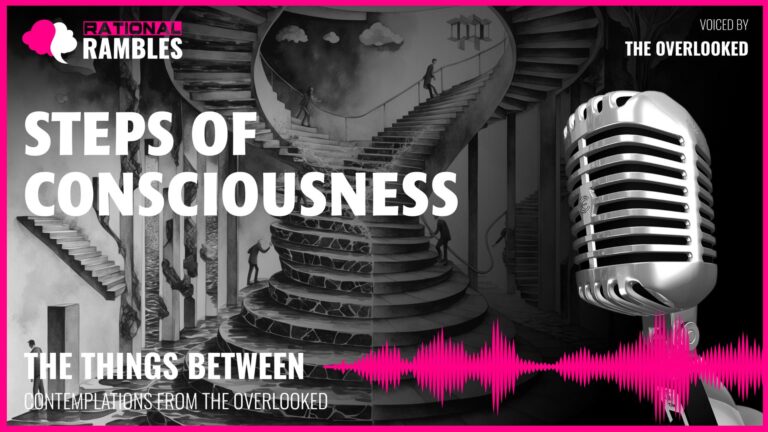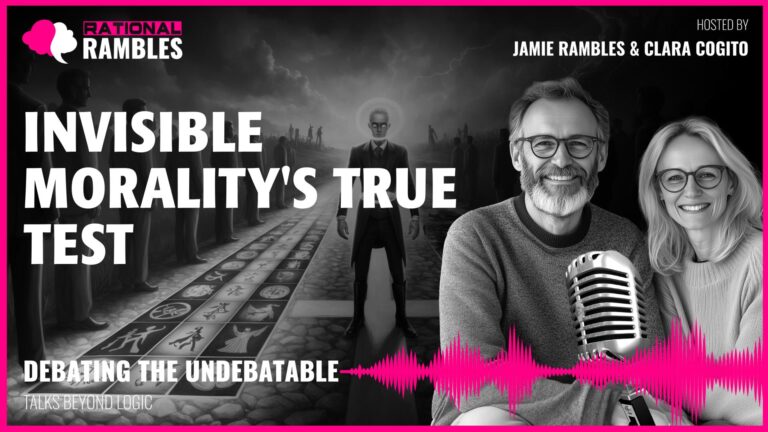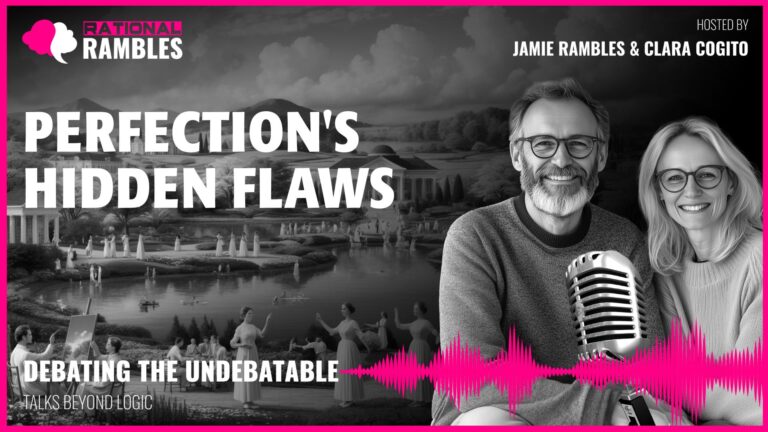Alternative Realities of Mind: Exploring the Uncharted Territories of Human Consciousness
The human mind—our consciousness, perception, emotions, and thought patterns—represents only one configuration among potentially infinite possibilities of experiencing reality. We often assume our psychological framework is the only valid or “normal” way to experience the world, but what if our brains could access entirely different mental landscapes? What if our conventional understanding of emotions, perceptions, and cognitive processes represents merely a tiny island in a vast ocean of possible psychological states?
This philosophical and psychological exploration invites us to venture beyond the familiar shores of ordinary consciousness and consider the profound implications of alternative mental realities. By examining these possibilities, we not only expand our understanding of human psychology but also challenge fundamental assumptions about normality, reality, and the nature of mind itself.
The Limitations of Our Psychological Reality
Our conscious experience—the way we perceive colors, process emotions, structure time, and organize thoughts—feels inevitable and universal. It seems to be the only possible way to experience reality. Yet this assumption falters when we consider evidence suggesting that our psychological reality is merely one possibility among many.
William James, the pioneering psychologist and philosopher, proposed that “our normal waking consciousness is but one special type of consciousness, whilst all about it, parted from it by the filmiest of screens, there lie potential forms of consciousness entirely different.” This insight has profound implications: what we consider normal mental functioning may be just one region in a vast landscape of possible consciousness.
The very architecture of our minds shapes and constrains our experience in ways we rarely notice. Our perceptual systems filter an overwhelming flood of sensory data, allowing only a tiny fraction to reach conscious awareness. Our emotional framework categorizes complex physiological states into a limited repertoire of labeled feelings. Our attentional mechanisms spotlight certain aspects of reality while relegating others to the periphery or excluding them entirely.
These filters and frameworks don’t simply organize an objective reality—they actively construct our subjective experience. As Immanuel Kant demonstrated in his distinction between noumena (things-in-themselves) and phenomena (things as they appear to us), we never perceive reality directly but only through the mediating structures of our minds. If those structures were fundamentally different, our experienced world would be unrecognizably transformed.
Windows Into Alternative Mental States
While we cannot directly access consciousness configurations radically different from our own, various phenomena provide glimpses into these alternative psychological realities. These windows suggest the potential breadth of mental experience beyond our ordinary parameters.
Altered States of Consciousness
Psychedelic substances temporarily reconfigure neural connectivity patterns, creating states that transcend normal brain functioning. Individuals who have experienced psychedelic states often report encountering what they describe as “impossible emotions” or perceptions that defy linguistic categorization. These aren’t merely intensifications of familiar emotions but qualitatively distinct psychological states that cannot be adequately described within our conventional emotional taxonomy.
The fact that relatively minor biochemical changes can produce such radically different experiential worlds suggests that our brains possess the hardware potential for a much wider range of consciousness than we typically access. These states aren’t necessarily mere disruptions of normal function but may represent equally valid alternative configurations of consciousness with their own internal coherence and logic.
Neurodiversity and Alternative Cognitive Structures
Neurodivergent conditions such as autism, synesthesia, and schizophrenia provide valuable insights into alternative ways of experiencing reality. Rather than viewing these as simply disorders or deficits, we can understand them as different configurations of mental processing that reveal aspects of reality inaccessible to neurotypical cognition.
Temple Grandin, a renowned animal behavior expert with autism, has described how her condition allows her to “think in pictures,” giving her insights that neurotypical individuals might miss. Her visual thinking represents not an impairment but an alternative cognitive structure with unique advantages for certain tasks and perspectives.
Synesthesia—where stimulation of one sensory pathway leads to automatic, involuntary experiences in another—further demonstrates how radically different perceptual frameworks are possible. For a synesthete who experiences colors when hearing specific musical notes, this isn’t a hallucination but a consistent, structured way of experiencing reality that reveals connections typically filtered out by non-synesthetic perception.
Cross-Cultural Variation in Psychological Experience
Anthropological research reveals significant cultural variation in emotional experiences, cognitive processes, and perceptual frameworks. These differences aren’t merely superficial but reflect genuinely distinct psychological realities constructed through different cultural practices and conceptual systems.
Research by Richard Nisbett has demonstrated that East Asian participants often employ dialectical thinking that embraces apparent contradictions, while Western participants typically prefer formal logical consistency. These aren’t simply different styles of reasoning but fundamentally different ways of constructing mental reality, leading to distinctive psychological experiences and perspectives.
Anthropologist Tanya Luhrmann’s work on different cultural models of mind shows how conceptual frameworks shape psychological experience. She found that people who believe in the possibility of hearing God’s voice are more likely to have experiences they interpret as divine communication—demonstrating how our conceptual frameworks actually create access to different psychological realities.
The Philosophical Implications of Alternative Mental Realities
The possibility of alternative psychological realities raises profound philosophical questions about the nature of consciousness, reality, and the relationship between them. These questions challenge fundamental assumptions about what constitutes “normal” or “real” experience.
The Arbitrary Nature of Our Psychological Configuration
If our psychological reality is merely one possibility among many, how arbitrary is it? Our particular configuration of consciousness seems inevitable to us, but from a broader perspective, it may be contingent on evolutionary history, cultural development, and individual neurological formation.
From an evolutionary standpoint, our psychological architecture evolved through natural selection to help us survive and reproduce in specific environments. Our emotions serve as rapid appraisal systems that motivate adaptive behavior—fear triggers flight from danger, disgust helps us avoid contaminants. This suggests our consciousness isn’t arbitrary but highly specialized for particular functional demands.
However, different evolutionary paths could have led to radically different types of consciousness. Consider the octopus, which represents a completely independent evolution of complex intelligence, with a nervous system that evolved from a different ancestral starting point than ours. Their distributed cognition—with two-thirds of their neurons in their arms—likely creates a subjective experience we can barely comprehend. Philosopher Peter Godfrey-Smith calls this “the most other of minds” we might encounter on Earth.
This evolutionary perspective suggests that while our psychological reality isn’t random, it represents just one branch in a vast tree of possible consciousness configurations that could have evolved under different selective pressures.
The Accessibility of Other Psychological Realities
Can we access these alternative psychological realities, or are they forever beyond our reach? This question involves both practical and conceptual challenges.
The practical challenge concerns methods for accessing alternative states. Various techniques—from meditation and breathwork to psychedelics and technological interventions—can temporarily alter consciousness. But these may provide only limited glimpses into alternative realities rather than full access to fundamentally different states.
The conceptual challenge is more profound: if these alternative psychological realities operate according to fundamentally different logical structures or employ concepts we lack, they may be partially or wholly incomprehensible to us. As Ludwig Wittgenstein observed, “If a lion could speak, we could not understand him.” The issue isn’t just language but the entire form of life that gives meaning to experience.
This connects to Thomas Nagel’s famous question about bat consciousness: “What is it like to be a bat?” Nagel argued that a bat’s sonar-based perception creates a subjective experience so alien to ours that we cannot truly imagine it. Even if we could somehow access bat consciousness, our existing conceptual frameworks might be inadequate to comprehend or communicate that experience.
The Communication Problem
A critical methodological challenge emerges: how would we recognize or study these alternative psychological realities if they’re potentially incomprehensible to our normal cognitive frameworks?
Research on altered states shows that experiences in these states often cannot be adequately communicated afterward. People who have profound mystical or psychedelic experiences frequently report that words are insufficient to describe what they experienced. This suggests fundamental constraints on communicability between different states of consciousness.
This communication problem connects to philosopher John Searle’s Chinese Room thought experiment, which questions whether a system following rules to manipulate symbols can truly understand those symbols. Perhaps our normal consciousness can manipulate symbols representing alternative emotional states without truly “understanding” them in their original form.
In developmental psychology, we see a similar phenomenon with young children who lack certain cognitive structures. A four-year-old cannot truly understand complex emotions like nostalgia or existential angst—not because they’re unintelligent, but because they haven’t developed the necessary mental frameworks. Our relationship to alternative psychological realities may be similar—we may lack the required mental structures to fully access or comprehend them.
Redefining Psychological Normality
Recognizing the possibility of alternative psychological realities requires us to reconsider what constitutes “normal” mental functioning. Traditional definitions of normality rely on statistical frequency, functional adaptation to current social demands, and absence of subjective distress. But these criteria may arbitrarily privilege one region in a vast possibility space of consciousness.
From Binary Categories to Multidimensional Landscapes
Instead of a binary normal/abnormal distinction, we might conceptualize a multidimensional landscape of psychological possibilities, each with different functional properties in different contexts. This perspective aligns with philosopher Michel Foucault’s work showing how definitions of madness reflect power structures rather than objective realities.
The neurodiversity movement exemplifies this shift, arguing that conditions like autism represent valuable cognitive variations rather than disorders to be cured. Similarly, cross-cultural research shows that phenomena labeled as psychopathology in certain cultural contexts might be valued as spiritual gifts in others.
This reconceptualization doesn’t mean abandoning all distinctions between helpful and harmful mental states. Rather, it suggests evaluating psychological states based on their functional properties in specific contexts rather than their deviation from statistical norms.
Psychological Flexibility as a New Standard
If multiple psychological realities exist and have value, perhaps “normal” mental functioning should be redefined not as stability within a single framework but as flexibility across multiple frameworks. Philosopher Catherine Malabou discusses “plasticity”—the capacity to both receive and give form—as the defining characteristic of consciousness.
From this perspective, mental health might be defined as the capacity to move fluidly between different states of consciousness while maintaining overall integration and adaptive functioning. This would reframe many currently pathologized experiences as potentially valuable if they’re accessible by choice rather than intrusive.
This emphasis on flexibility aligns with philosopher William James’ concept of “the pluralistic universe”—a reality composed of multiple, overlapping realities rather than a single monolithic one. Perhaps healthy consciousness isn’t about discovering the “one true” psychological reality but developing the capacity to move between many equally valid ones as circumstances require.
The Ontological Significance of Alternative Mental Realities
The possibility of alternative psychological realities raises profound questions about the nature of reality itself. Are these merely different subjective interpretations of the same objective reality, or do they reveal different aspects of a multifaceted reality that cannot be fully grasped from any single perspective?
Beyond Perceptual Differences: Alternative Ontological Domains
Alternative psychological realities might not just involve different ways of processing the same information but access to entirely different domains of reality. Just as a bat’s sonar reveals aspects of the world invisible to human senses, alternative conscious states might reveal ontological dimensions typically inaccessible to ordinary awareness.
This connects to research on attention as a selective mechanism. Different attentional filters would create different experienced worlds. Individuals with ADHD, for instance, often report noticing connections and details that others miss because of differences in how their attention operates. Scale that up dramatically, and you’d have a radically different psychological reality based on different filtration systems.
Alternative Logical Structures and Mathematical Intuitions
Alternative psychological realities might operate according to fundamentally different logical principles. Philosopher Graham Priest has developed paraconsistent logics that allow contradictions to be true. If our minds operated according to such principles, we might inhabit a psychological reality where contradictions could be directly perceived as valid.
This raises questions about whether mathematics itself—often considered the most objective and universal domain of knowledge—might look different to alternative minds. Mathematician Verena Huber-Dyson suggested that even mathematics isn’t culturally or cognitively neutral but reflects particular ways of thinking that might not be universal across all possible forms of intelligence.
Developmental research on mathematical cognition shows that humans have innate systems for representing approximate quantities and for tracking small numbers of objects precisely. These cognitive foundations shape how we understand mathematics. Different innate systems would lead to radically different mathematical intuitions.
Consciousness as Filtration Rather Than Production
These considerations align with theories of consciousness that emphasize filtering rather than production. According to these models, the brain’s primary function may be filtering out the overwhelming majority of information to create a manageable, survival-oriented experience. Alternative states might temporarily alter these filters, allowing access to usually excluded aspects of a more comprehensive consciousness.
Philosopher Henri Bergson proposed a similar view with his concept of “intuition” as a mode of knowledge that grasps reality more directly than conceptual thought, revealing aspects normally filtered out by practical consciousness. From this perspective, different psychological realities aren’t entirely separate domains but aspects of a larger, more comprehensive consciousness that we typically access only partially.
Cultivating Access to Alternative Psychological Realities
If alternative psychological realities exist or can be created, how might we deliberately cultivate access to them? Various approaches offer different pathways to expanding our psychological possibilities.
Conceptual Engineering and Linguistic Innovation
Our conceptual frameworks shape what psychological realities become accessible to us. By developing new concepts and refining existing ones, we might open doors to previously inaccessible experiential domains.
Philosopher Rudolf Carnap proposed the method of “explication,” where we refine intuitive concepts into more precise ones. This suggests we might deliberately engineer conceptual tools that open new experiential domains. Similarly, philosopher Hans Vaihinger proposed a philosophy of “as if”—that humans progress by creating useful fictions that we treat “as if” they were true. By consciously creating new conceptual fictions, we might bring new psychological realities into being.
We can see this process in therapeutic practices like internal family systems therapy, where clients are invited to relate to parts of themselves “as if” they were distinct entities with their own needs and intentions. This conceptual framework often creates new subjective experiences that weren’t previously accessible, suggesting that even subtle shifts in how we conceptualize our inner experience can create significantly different psychological realities.
Artistic Practices as Technologies of Consciousness
Artists often create works that evoke states beyond ordinary language. Philosopher Nelson Goodman suggested that art creates new “ways of worldmaking.” Artistic practices might function as technologies for temporarily inhabiting alternative psychological realities.
Research supports this view, showing that art can induce altered states of consciousness. Studies on “aesthetic chills” reveal distinctive neurological patterns when people are deeply moved by art. Some evidence suggests that the default mode network—associated with self-referential processing—shows similar changes during aesthetic experiences as during meditation or psychedelic states.
Literature offers a unique window into alternative psychological realities. When we read fiction, we temporarily inhabit another consciousness structured by different concepts and experiences. Philosopher Martha Nussbaum argues that novels develop our capacity for empathic understanding precisely because they let us temporarily experience reality through another’s conceptual framework.
Contemplative Practices and Psychological Development
Contemplative traditions have developed sophisticated methods for cultivating alternative states of consciousness through meditation, breathwork, movement practices, and other techniques. These practices often require significant training and development, suggesting that accessing alternative psychological realities might require not just altered brain states but the development of new cognitive capacities.
This developmental perspective is supported by research showing that long-term meditators can access states of consciousness unavailable to novices. These states aren’t simply switched on but are developmentally scaffolded through progressive training.
Philosopher Ken Wilber’s work on stages of consciousness development suggests that each developmental stage isn’t just a different perspective but a different way of knowing with its own internal logic and experiential qualities. This implies that accessing alternative psychological realities might require developmental processes that build new cognitive capacities rather than simply altering existing ones.
Ethical Dimensions of Consciousness Exploration
The possibility of accessing or creating alternative psychological realities raises profound ethical questions that extend beyond scientific or therapeutic considerations. These questions concern what kinds of consciousness we should cultivate and why.
The Ethics of Consciousness Engineering
If we develop methods to access alternative psychological realities—whether through neurotechnology, chemical compounds, or conceptual engineering—should we pursue this? Philosopher David Pearce has argued for what he calls the “hedonistic imperative”: that we have a moral obligation to eliminate suffering through consciousness engineering.
However, this approach raises concerns about autonomy, identity, and authenticity. If someone accesses a radically different psychological reality, in what sense are they the “same person”? And there are practical considerations—if these alternative states are incompatible with functioning in consensus reality, how do we balance exploration with practical necessities?
These questions connect to philosopher Robert Nozick’s “experience machine” thought experiment, which asks whether we would choose to plug into a machine that generates perfect simulated happiness. Most people reject this option, suggesting we value authenticity and connection to reality alongside positive experience.
The Question of Authenticity
However, the experience machine may present a false dichotomy between authentic reality and illusory happiness. If alternative psychological states reveal aspects of reality we normally can’t access—like ultraviolet vision revealing patterns invisible to the naked eye—then they might enhance authentic connection rather than diminishing it.
Philosopher Alva Noë argues that consciousness isn’t something that happens inside our heads but is a kind of skilled engagement with the world. From this perspective, alternative psychological states might represent different modes of engagement with reality rather than departures from it.
This aligns with research on embodied cognition showing how our thinking is shaped by physical interaction with the environment. Different ways of moving and engaging physically would create different psychological realities. Studies on gesture demonstrate that people’s thought patterns change when they use different gestures while reasoning. Scale that up dramatically, and you’d have fundamentally different cognitive worlds based on different embodied relationships.
Equitable Access and Social Justice
If accessing alternative psychological realities requires significant development or technological resources, this raises questions about equitable access. Philosopher Peter Sloterdijk describes spiritual practices as “anthropotechnics”—technologies for transforming human capabilities. But these have historically been available primarily to those with leisure time for intensive practice.
Would technologies for accessing alternative psychological realities exacerbate existing social inequalities? Current technologies like neurofeedback or transcranial magnetic stimulation that can alter mental states are unevenly distributed. Additionally, these technologies might be designed around neurotypical brains, potentially excluding neurodivergent individuals whose brains are structured differently.
This connects to feminist philosopher Miranda Fricker’s concept of “hermeneutical injustice”—where someone’s experience can’t be properly understood because the conceptual resources to interpret it don’t exist in dominant discourse. Some people might already access alternative psychological realities but cannot communicate them because our shared conceptual frameworks exclude their experiences.
Integration and the Plurality of Consciousness
Perhaps the most important insight emerging from this exploration is the value of integration—not just accessing alternative psychological realities but integrating the insights gained from them into our broader understanding of consciousness and reality.
Beyond Either/Or: The Pluralistic Approach
Rather than privileging either our ordinary consciousness or alternative states, a pluralistic approach recognizes value in multiple forms of consciousness. Many indigenous psychological frameworks have long recognized multiple valid ways of knowing and experiencing. These traditions often emphasize integration rather than privileging any single state of consciousness as the “real” one.
This pluralistic perspective aligns with philosopher William James’ concept of “the pluralistic universe”—a reality composed of multiple, overlapping realities rather than a single monolithic one. From this perspective, healthy consciousness isn’t about discovering the “one true” psychological reality but developing the capacity to move between many equally valid ones as circumstances require.
Integration as Key to Transformation
The transformative potential of alternative psychological realities depends on integration—incorporating insights from alternative states into our primary everyday consciousness. Psychedelic therapy research demonstrates this clearly—the therapeutic benefits come not just from the alternative state experienced during the session but from the integration of insights from that state into everyday consciousness.
Philosopher Pierre Hadot described ancient philosophical practices as “spiritual exercises” designed not just for intellectual understanding but for transformation of one’s entire way of being. Similarly, accessing alternative psychological realities might be valuable not just for the experience itself but for how it transforms our ordinary consciousness through integration.
Collective Integration and Social Imagination
At a social level, integrating insights from alternative psychological realities might expand our collective imagination of what’s possible for human consciousness. Philosopher Charles Taylor discusses “social imaginaries”—the ways ordinary people imagine their social existence. These imaginaries shape what experiences are possible within a society.
From this perspective, we might have a responsibility to create more expansive social imaginaries that accommodate diverse psychological possibilities. This doesn’t mean abandoning shared frames of reference that allow social coordination but developing what philosopher Richard Rorty called “liberal irony”—maintaining temporary, contingent frameworks while recognizing their constructed nature.
Conclusion: The Expanding Horizons of Mind
Our exploration of alternative realities of mind reveals that human consciousness may be far more diverse and expansive than our current frameworks suggest. Rather than a fixed, singular psychological reality, consciousness appears to be a dynamic, pluralistic phenomenon with the potential to manifest in myriad forms.
This perspective challenges us to reconsider fundamental assumptions about psychological normality, the nature of reality, and what constitutes authentic human experience. It suggests that mental health might be better understood not as adherence to a single standard but as the capacity to navigate multiple psychological realities while maintaining integration and adaptability.
The recognition that we’ve only glimpsed the outlines of these possibilities is both humbling and exciting. It suggests that human consciousness might have capacities we’ve barely begun to explore, and that the future of psychological understanding might be far more diverse and expansive than our current frameworks suggest.
As we continue to investigate these alternative realities of mind—through scientific research, philosophical inquiry, artistic exploration, and contemplative practice—we may discover new dimensions of human experience that transform our understanding of consciousness itself. In this ongoing exploration, we might find that the true nature of mind is not fixed but endlessly creative, continuously generating new ways of being and knowing in the world.


